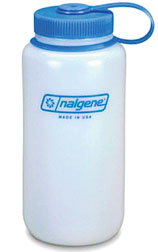Flexible, but harmful plastics
Janani AMARASEKARA
We don’t need to give you a detailed description of plastics today as
we have already written about plastic; about the different varieties and
their recycling, in our last ‘The World of Science’ article. So, today,
we will tell you about the negative side of plastics.
 This is basically about the risk of re-using plastic bottles as
liquid containers. This is basically about the risk of re-using plastic bottles as
liquid containers.
How many of you re-use those empty water bottles, soda and beverage
bottles to take water to school? Yes! They are easy to carry and could
be easily fitted into your school bag, but, did you know that these
plastic bottles may be silent killers?
“Plastic can leak out chemicals that can cause cancer and many other
health risks”, said Physician Dr. Waruna Gunethilake, a person who is
very interested in this subject. “This process varies from plastic to
plastic. Also, the amount of chemicals that leak out could be more than
we expect”, he added.
As already said, the plastic bottles we use are made of Polyethylene
Terephthalate, popularly known as PET. These PET bottles contain a
potentially carcinogenic element known as DEHA, which is a
cancer-causing chemical agent.
According to the Scientific American Magazine, Bisphenol A (BPA) is
another compound found in plastics. BPA can imitate oestrogen (the
female hormone) binding to the same receptors throughout the human body
as the natural hormone.
Tests have shown that the chemical can promote breast cancer in
humans and decrease sperm count in rats. These chemicals start leaking
out when the plastic has been put to hard use and exposed to high
temperature, like microwaves, hot liquids and direct sunlight.
Repeated washing and rinsing can cause the plastic molecules to break
easily. These breaks are not visible to the naked eye, but are just
micro-breaks (really tiny). Thin bottles have a higher probability of
chemicals leaking out.
“Storing things inside plastic bottles in the refrigerator will also
cause the plastic molecules to break”, said Dr. Gunethilake. Did you
know that BPA leaks 55 times faster than in normal conditions? Scary,
isn’t it?
“Plastic bottles are safe for one-time use only. If you really need
to, you could use one for a few days, but a week is the maximum time
period you should not be using these bottles”, he added.
Infants and HIV-affected people should be given liquids stored in
these water bottles at all.
  The biggest problem arises when these plastics are being used to make
infant feeding bottles. The biggest problem arises when these plastics are being used to make
infant feeding bottles.
Recent research has revealed that infant feeding bottles also leak a
certain level of BPA, which will cause considerable harm to the infants.
Now, you might have a question! How are we going to take water to
school? No worries about it. There are types of plastic which are safe
for everyday use.
As we explained in the last issue, HDPE (No. 2), Low-density
Polyethylene (No. 4) and Polypropylene (No. 5) can be re-used as we
please. Polypropylene, though less recyclable, has not been shown to
leak any carcinogens or endocrine disruptors.
There are readily available reusable containers made of this type of
plastic. There are also other types which are said to be safe and free
of harmful chemicals.
“These types of plastic contain a coating inside the container which
prevents the leaking of chemicals”, explained Dr. Gunethilake.
But, you must keep in mind that all plastics can leak chemicals under
certain conditions.
As a rule of thumb, do not subject even the most durable plastic
containers to high temperatures. Don’t ever drink water from bottles
which had been left in the vehicle on hot and sunny days.
You may have seen plastic containers with stickers on them indicating
‘microwave-safe’ or ‘microwavable’, meaning that such containers
probably won’t melt in the microwave oven. But, that is not a promise
that they won’t leak out chemicals into your food. Also, do not use any
plastic containers that appear to be old, stained or worn, since
bacteria can hide inside scratches.
“It’s best to use boiled, cooled water for drinking, without going
for bottled water. You must always pay extra attention to your water
container. Your health should be the first priority in your life”,
advised Dr. Gunethilake. |
